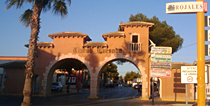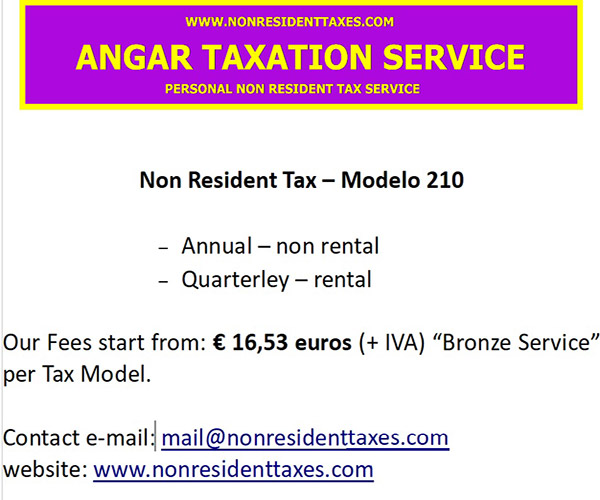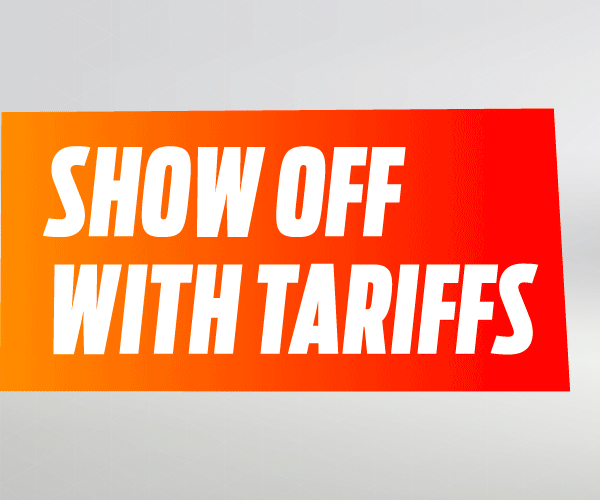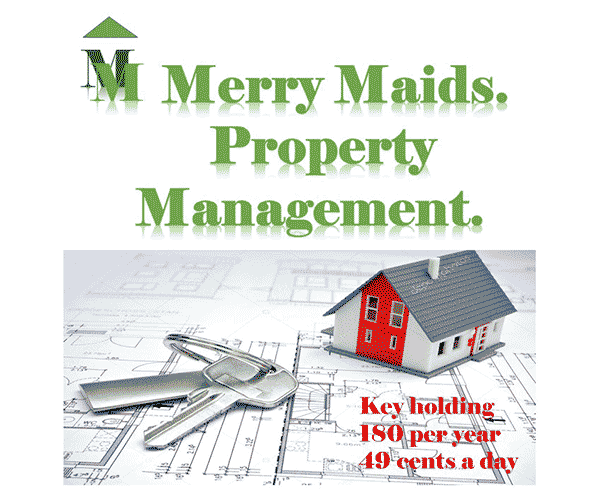Join Talk Quesada


 Welcome to Talk Quesada! My name's Alex and this is my website all about Ciudad Quesada in Spain. Talk Quesada is free to sign up and use so register below!
Welcome to Talk Quesada! My name's Alex and this is my website all about Ciudad Quesada in Spain. Talk Quesada is free to sign up and use so register below!
THE “IBI LOCAL RATE” (“Impuesto sobre bienes inmuebles”)
THE “IBI LOCAL RATE” (“Impuesto sobre bienes inmuebles”)
![]() by ricor » Mon Sep 29, 2014 10:16 am
by ricor » Mon Sep 29, 2014 10:16 am
THE “IBI LOCAL RATE” (“Impuesto sobre bienes inmuebles”):
SIMPLE TIPS OF HOW TO INTERPRET THE RECEIPT:
Dear readers,
The topic of this week is the IBI tax. Very often we receive a lot of questions from clients who do not understand what the IBI means and where and how to pay it. So, for those who might still be unaware about the existence of this local rate, we hope you will find this information useful.
First of all, the IBI is a local rate payable to the local authorities by ALL residents and Non resident people (irrespective of their nationality), as a consequence of owning any kind of property in Spain, (dwelling, garage, rustic or urban dwelling, plot of land, etc).
Therefore, it doesn’t matter if you are Spanish or English or you use the dwelling as a second residence only. You will still be liable to pay it! In the “Valencian Region”, the office in charge of managing the payment of the IBI is called the “SUMA OFFICE”.
So, remember, every time you might receive a letter from SUMA, in 90% of occasions, it will be unfortunately bad news for you.
Second, the payment is due annually and it is highly advisable that you to instruct your bank to set direct debit, so the charge will be made automatically around September-October each year directly into your bank account. This will allow you to obtain a little “bonus” for setting up the payment by standing order.
Third, if you are planning to buy a property, do not forget to ask the seller for a copy of the latest 2 or 3 IBI receipts duly paid. Moreover, be extra cautious if the property you intend to buy is “rustic” (a country house for example), as the lack of IBI receipt will reveal a legality problem. Sometimes, you will notice that the property is paying a very little tax, simply because it was registered only as a plot of land or perhaps due to the fact that it was registered long time ago but as a “warehouse” instead of a dwelling! In situations like this, before signing the Title Deed at the Notary, you must always demand the seller to correct this situation by updating the receipts at their own expense.
Finally, please find below an example of a standard IBI receipt together with some useful tips that will help you understand how this rate is calculated:
1.- “ VALOR CATASTRAL”: The cadastral value of the property is the rateable value of the property, which may bear little resemblance to what you believe the property to be worth, or what you actually paid for it. The Valor Catastral is usually around 50% to 70% of its market value.
2.”ULTIMA REVISION”: Due to the fact that the market value of properties can change over time, local authorities will periodically update the cadastral value assigned to each property. You will be able to identify when this happens from your last receipt where you will find it displayed. However, in practice, this figure can be legally reviewed by bankrupt local authorities, with the sole purpose of collecting money, irrespective of the actual market value of the property. In other words, almost every year, the IBI rate will most likely increase, even if the market price of properties might have gone down. For example, in cities, like Madrid, studies have revealed that property owners have seen huge increases as the IBI has been increased in more than 54% in the last 5 years! Absolutely disgraceful!
3. “ TIPO IMPOSITIVO”: Once the 'Valor Catastral' has been decided, a different percentage will be applied depending on a number of factors: Rural or Urbanised land, Type of Property, Square meter of Land and Build, Proximity to services, Infrastructure etc, etc. Each Town Hall will place a slightly different importance on each factor or criteria mentioned.
4. “BONIFICACIONES”: Finally, “bonifications” will be taken into account in order to calculate the final quote. The most frequent one is setting standing order, as indicated earlier.
To sum up, if you suspect that your bill is too excessive and if you disagree with the assigned value, the first thing that you should do is check all the papers that you hold regarding your property (title deed, previous IBI receipts, etc).
We’ve encountered a few situations where the SUMA office did actually make several mistakes, especially with regards to old rustic country houses. Therefore, do never take for granted that the value given by the town hall or the SUMA office is the correct one! Under these circumstances you should contact us urgently for advice and we will be delighted to advice you about the most effective way to request for a revaluation aimed to rectify the error.
Therefore, should you ever need a reliable, 100% independent, honest, cost effective and efficient English speaking Spanish solicitor, to help you with your property conveyance or taxation matters, (or with any other legal problem), do not hesitate to contact us.
Thank you very much for your kind attention and we look forward to helping you!
Mr Oscar Ricor
“NON-PRACTISING ENGLISH SOLICITOR IN ENGLAND AND WALES”, under the “Solicitors Regulation Authority” (SRA) SRA number 519196 and practicing Spanish Solicitor Nº1247
SIMPLE TIPS OF HOW TO INTERPRET THE RECEIPT:
Dear readers,
The topic of this week is the IBI tax. Very often we receive a lot of questions from clients who do not understand what the IBI means and where and how to pay it. So, for those who might still be unaware about the existence of this local rate, we hope you will find this information useful.
First of all, the IBI is a local rate payable to the local authorities by ALL residents and Non resident people (irrespective of their nationality), as a consequence of owning any kind of property in Spain, (dwelling, garage, rustic or urban dwelling, plot of land, etc).
Therefore, it doesn’t matter if you are Spanish or English or you use the dwelling as a second residence only. You will still be liable to pay it! In the “Valencian Region”, the office in charge of managing the payment of the IBI is called the “SUMA OFFICE”.
So, remember, every time you might receive a letter from SUMA, in 90% of occasions, it will be unfortunately bad news for you.
Second, the payment is due annually and it is highly advisable that you to instruct your bank to set direct debit, so the charge will be made automatically around September-October each year directly into your bank account. This will allow you to obtain a little “bonus” for setting up the payment by standing order.
Third, if you are planning to buy a property, do not forget to ask the seller for a copy of the latest 2 or 3 IBI receipts duly paid. Moreover, be extra cautious if the property you intend to buy is “rustic” (a country house for example), as the lack of IBI receipt will reveal a legality problem. Sometimes, you will notice that the property is paying a very little tax, simply because it was registered only as a plot of land or perhaps due to the fact that it was registered long time ago but as a “warehouse” instead of a dwelling! In situations like this, before signing the Title Deed at the Notary, you must always demand the seller to correct this situation by updating the receipts at their own expense.
Finally, please find below an example of a standard IBI receipt together with some useful tips that will help you understand how this rate is calculated:
1.- “ VALOR CATASTRAL”: The cadastral value of the property is the rateable value of the property, which may bear little resemblance to what you believe the property to be worth, or what you actually paid for it. The Valor Catastral is usually around 50% to 70% of its market value.
2.”ULTIMA REVISION”: Due to the fact that the market value of properties can change over time, local authorities will periodically update the cadastral value assigned to each property. You will be able to identify when this happens from your last receipt where you will find it displayed. However, in practice, this figure can be legally reviewed by bankrupt local authorities, with the sole purpose of collecting money, irrespective of the actual market value of the property. In other words, almost every year, the IBI rate will most likely increase, even if the market price of properties might have gone down. For example, in cities, like Madrid, studies have revealed that property owners have seen huge increases as the IBI has been increased in more than 54% in the last 5 years! Absolutely disgraceful!
3. “ TIPO IMPOSITIVO”: Once the 'Valor Catastral' has been decided, a different percentage will be applied depending on a number of factors: Rural or Urbanised land, Type of Property, Square meter of Land and Build, Proximity to services, Infrastructure etc, etc. Each Town Hall will place a slightly different importance on each factor or criteria mentioned.
4. “BONIFICACIONES”: Finally, “bonifications” will be taken into account in order to calculate the final quote. The most frequent one is setting standing order, as indicated earlier.
To sum up, if you suspect that your bill is too excessive and if you disagree with the assigned value, the first thing that you should do is check all the papers that you hold regarding your property (title deed, previous IBI receipts, etc).
We’ve encountered a few situations where the SUMA office did actually make several mistakes, especially with regards to old rustic country houses. Therefore, do never take for granted that the value given by the town hall or the SUMA office is the correct one! Under these circumstances you should contact us urgently for advice and we will be delighted to advice you about the most effective way to request for a revaluation aimed to rectify the error.
Therefore, should you ever need a reliable, 100% independent, honest, cost effective and efficient English speaking Spanish solicitor, to help you with your property conveyance or taxation matters, (or with any other legal problem), do not hesitate to contact us.
Thank you very much for your kind attention and we look forward to helping you!
Mr Oscar Ricor
“NON-PRACTISING ENGLISH SOLICITOR IN ENGLAND AND WALES”, under the “Solicitors Regulation Authority” (SRA) SRA number 519196 and practicing Spanish Solicitor Nº1247
Mr Oscar Ricor. NON-PRACTISING ENGLISH SOLICITOR IN ENGLAND AND WALES, under the “Solicitors Regulation Authority” (SRA) SRA number 519196 and practicing Spanish Solicitor&Abogado.
-

ricor - Posts: 5
- Joined: Sun Sep 28, 2014 10:07 am
- Location: Alicante and Torrevieja
- Which part of Spain are you from?: alicante
- Gender: Male
1 post
• Page 1 of 1
Related topics
-
- Similar Topics
- Replies
- Views
- Last post
-
-
Omron heart rate monitor

by DPS Iberica » Mon May 15, 2023 6:26 pm in Items for sale in Quesada and surrounding areas - 5
- 212
-
by DPS Iberica

Thu Dec 21, 2023 10:45 am
-
Omron heart rate monitor
-
-
OMRON heart rate / Blood pressure monitor

by DPS Iberica » Thu Jun 08, 2023 10:12 am in Items for sale in Quesada and surrounding areas - 2
- 157
-
by DPS Iberica

Fri Jun 09, 2023 3:15 pm
-
OMRON heart rate / Blood pressure monitor
-
-
Local school
by Quesadacurious » Mon May 22, 2023 1:56 pm in Quesada general discussion - 0
- 187
-
by Quesadacurious

Mon May 22, 2023 1:56 pm
-
Local school
-
-
WANTED Cheap car for for local use
by jpeg » Sat Nov 25, 2023 9:28 am in Items for sale in Quesada and surrounding areas - 1
- 271
-
by earlybay

Sun Nov 26, 2023 9:41 am
-
WANTED Cheap car for for local use
-
-
Local female translator

by Mobelo » Mon Mar 25, 2024 4:53 pm in Introduce yourselves - 1
- 210
-
by lucia

Tue Mar 26, 2024 10:21 am
-
Local female translator
Return to Taxes in Spain: Suma, NIE and general tax advice
Who is online
Users browsing this forum: No registered users and 6 guests
Login
Find in Quesada
Quesada pages
Quesada discussion
 Quesada general discussion
Quesada general discussion Banking and finances
Banking and finances Broadband, Wifi, Phone and TV
Broadband, Wifi, Phone and TV Buses and public transport in and around Quesada
Buses and public transport in and around Quesada Driving to Spain / Car hire in Spain / Buying and owning a car in Spain
Driving to Spain / Car hire in Spain / Buying and owning a car in Spain Fiestas in Quesada
Fiestas in Quesada Flights, baggage and airports
Flights, baggage and airports Health services in Quesada
Health services in Quesada Insurances and wills in Spain
Insurances and wills in Spain Items for sale and wanted in and around Quesada
Items for sale and wanted in and around Quesada Interesting articles about Spain
Interesting articles about Spain Jobs and careers in Quesada
Jobs and careers in Quesada Lost and found in Quesada
Lost and found in Quesada Market days
Market days Places to go for free Wi-Fi
Places to go for free Wi-Fi Recommended restaurants / cafes / bars
Recommended restaurants / cafes / bars Recommended Tradesmen and Companies
Recommended Tradesmen and Companies Residency in Spain: padron, residencia and passport advice
Residency in Spain: padron, residencia and passport advice Safety / security information and property in Spain hints and tips
Safety / security information and property in Spain hints and tips Taxes in Spain: Suma, NIE and general tax advice
Taxes in Spain: Suma, NIE and general tax advice Taxis in Quesada
Taxis in Quesada Things to do and places to go in and around Quesada
Things to do and places to go in and around Quesada Utilities in Spain: Electric, gas and water recommendations and advice
Utilities in Spain: Electric, gas and water recommendations and advice Weather in Quesada
Weather in Quesada Where to buy things in and around Quesada
Where to buy things in and around Quesada Where to hire things in and around Quesada
Where to hire things in and around Quesada
Properties discussion
Businesses and places in Quesada
 Bars and pubs in Quesada
Bars and pubs in Quesada Beaches near Quesada
Beaches near Quesada Beauticians / Beauty salons in Quesada
Beauticians / Beauty salons in Quesada Bedding and soft furnishings shops in Quesada
Bedding and soft furnishings shops in Quesada Butchers in Quesada
Butchers in Quesada Car dealers in Quesada: new and used car dealers
Car dealers in Quesada: new and used car dealers Car garages, mechanics, tyre fitter centres in Quesada
Car garages, mechanics, tyre fitter centres in Quesada Car hire in Quesada
Car hire in Quesada DIY / Bricolage / Ferreteria stores in Quesada
DIY / Bricolage / Ferreteria stores in Quesada Equipment hire centers in Quesada
Equipment hire centers in Quesada Estate agents in Quesada
Estate agents in Quesada Furniture shops in Quesada
Furniture shops in Quesada Garden centres and garden furniture shops in Quesada
Garden centres and garden furniture shops in Quesada Golf Courses in Quesada
Golf Courses in Quesada Grills / gates / metal items shops in Quesada
Grills / gates / metal items shops in Quesada Hairdressers in Quesada
Hairdressers in Quesada Hotels, guest houses and bed and breakfasts in Quesada and nearby
Hotels, guest houses and bed and breakfasts in Quesada and nearby Internet service providers that cover Quesada
Internet service providers that cover Quesada Launderettes / dry cleaners in Quesada
Launderettes / dry cleaners in Quesada Markets in Quesada
Markets in Quesada Medical / Health centers in Quesada
Medical / Health centers in Quesada Pet shops in Quesada
Pet shops in Quesada Pharmacies / Chemist shops in Quesada
Pharmacies / Chemist shops in Quesada Restaurants in Quesada
Restaurants in Quesada Shopping centres in Quesada
Shopping centres in Quesada Sports centres and gyms in Quesada
Sports centres and gyms in Quesada Supermarkets in Quesada
Supermarkets in Quesada Swimming pool services in Quesada
Swimming pool services in Quesada Town Halls (Ayuntamientos) in Quesada
Town Halls (Ayuntamientos) in Quesada Waterparks/Aquaparks in Quesada
Waterparks/Aquaparks in Quesada
- TalkQuesada » Board index
- The team • Delete all board cookies • All times are UTC [ DST ]
- Our other websites:
- Costa Blanca forum
- Costa Calida forum
- Costa del Sol forum
- Costa de Almeria forum
- Costa de la Luz forum
- Costa Dorada forum
- Costa Brava forum
- UK forum
- Jobs in the UK
- Our policies:
- Privacy policy
- User agreement
- Content policy
- Website created and operated by JSM Forum Websites

























 Weather in Quesada
Weather in Quesada Webcams in Quesada
Webcams in Quesada